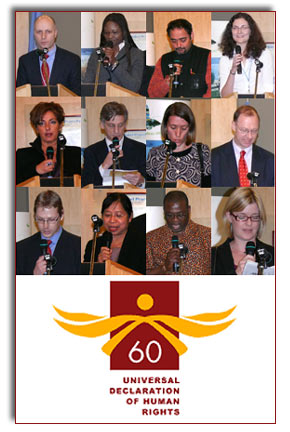 To mark Human Rights Day on 10 December and, more specifically, the 60th anniversary of the Universal Declaration of Human Rights, UNIS Vienna organized a lunchtime concert in the Rotunda of the Vienna International Centre. The concert consisted of several pieces of contemporary and classical music performed by the 1. Women's Chamber Orchestra of Austria (strings), as well as reading the full text of the
Universal Declaration of Human Rights in 31 different languages: each article, plus the Preamble, read out by a different person in their native language.
To mark Human Rights Day on 10 December and, more specifically, the 60th anniversary of the Universal Declaration of Human Rights, UNIS Vienna organized a lunchtime concert in the Rotunda of the Vienna International Centre. The concert consisted of several pieces of contemporary and classical music performed by the 1. Women's Chamber Orchestra of Austria (strings), as well as reading the full text of the
Universal Declaration of Human Rights in 31 different languages: each article, plus the Preamble, read out by a different person in their native language.
The Universal Declaration of Human Rights is the most translated document in the world and in reading the text in 31 different languages, UNIS Vienna not only paid tribute to the many different cultures and nationalities represented in the Vienna International Centre, but also to the Year of Languages which we mark this year. Article One was read in German by the Permanent Representative of Austria to the United Nations in Vienna, Ambassador Helmut Boeck. Staff members and other volunteers proceeded to read out the different articles in languages ranging from Amharic and Burmese, to Ukrainian and Uzbek. "I feel like I am representing my whole nation here today," exclaimed one reader who had presented article 13 in Fijian. Finding 31 readers had started off as a rather simple exercise of simply inviting colleagues and friends to participate, but turned into something slightly more difficult when the UNIDO staff member who had volunteered to read article 6 in Punjabi discovered that the official translation (on the ohchr.org website) was in a script he was unfamiliar with. All readers and participants expressed their eagerness to share the important text in their language and many articles prompted spontaneous applause from the audience. The English translation was projected on a screen simultaneously for all to follow.
The musical programme included works by contemporary female composers Betty Beath, Nancy van de Vale (who was also present) and Silvia Sommer, as well as by Dmitri Shostakovich and Joseph Haydn.
The 1. Women's Chamber Orchestra of Austria was founded in 1982 by Brigitte Ratz at a time when it was still difficult for talented female musicians to find employment in large Vienna orchestras. Today, the ensemble is well known for its versatility and creative choice in programming. Through its choice of an innovative mixture of classical and contemporary music and by focusing on different thematic areas, the Orchestra has attracted the attention of a broad audience. The Orchestra regularly invites female conductors as soloists as guests, and has toured widely, including participation in national and international festivals.